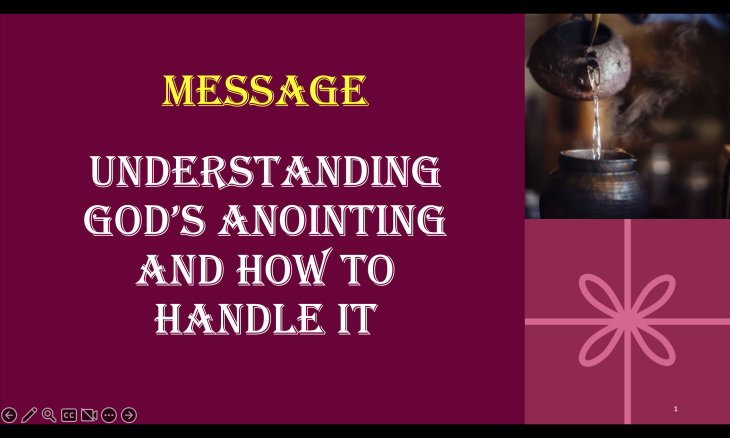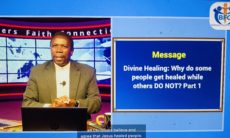The Anointing is the indwelling presence of the Holy Spirit in the life of a believer. It enables the believer to understand, apply, and administer spiritual truth. Simply put, the presence of the anointing enables believers to have a spiritual connection with their Heavenly Father.
1 John 2:27 – But the anointing which ye have received of him abideth in you, and ye need not that any man teach you: but as the same anointing teacheth you of all things, and is truth, and is no lie, and even as it hath taught you, ye shall abide in him.
Luke 4:18 – The Spirit of the Lord is upon me, because he hath anointed me to preach the gospel to the poor; he hath sent me to heal the brokenhearted, to preach deliverance to the captives, and recovering of sight to the blind, to set at liberty them that are bruised,
James 5:14 – Is any sick among you? let him call for the elders of the church; and let them pray over him, anointing him with oil in the name of the Lord:
Mark 6:13 – And they cast out many devils, and anointed with oil many that were sick, and healed them.
Leviticus 8:12 – And he poured of the anointing oil upon Aaron’s head, and anointed him, to sanctify him.
Leviticus 8:10 – And Moses took the anointing oil, and anointed the tabernacle and all that was therein, and sanctified them.
Exodus 40:9 – And thou shalt take the anointing oil, and anoint the tabernacle, and all that is therein, and shalt hallow it, and all the vessels thereof: and it shall be holy.
Anointing in the Old Testament
Ceremonial anointing: This was common ceremony in the Old Testament. It was a physical act involving the smearing, rubbing, or pouring of sacred oil on someone’s head (or on an object) as an outward symbol that God had chosen and set apart the person (or object) for a specific holy purpose. The process is referred in Hebrew as “mashach”
The Hebrew term mashach meant “to anoint or smear with oil.” The oil used for religious anointing was carefully blended with fine spices according to a specific formula prescribed by the Lord (Exodus 30:22–32). Using this oil for any other purpose was a serious offense carrying the penalty of being “cut off” from the community (Exodus 30:33).
Kings, priests, and prophets were anointed outwardly with oil to symbolize a more profound spiritual reality—that God’s presence was with them and His favor was upon them (Psalm 20:6; 28:8). While David was still a young shepherd, God told Samuel to anoint him to become king over Israel (1 Samuel 16:3). From that day forward, the Spirit of the Lord rested powerfully upon David’s life (1 Samuel 16:13; Psalm 89:20).
Anointing in the New Testament
In the New Testament, the anointing is not expressed in an outward ceremony but through sharing in the gift of the Holy Spirit (Romans 8:11).
At the moment of salvation, believers are indwelt by the Holy Spirit and joined to Christ, the Anointed One. As a result, we partake of His anointing (2 Corinthians 1:21–22). According to one scholar, this anointing “expresses the sanctifying influences of the Holy Spirit upon Christians who are priests and kings unto God today”
Anointing oil is still used today especially to the sick and also to set apart those that God has called and to separate them unto their calling.
The Bible says in Mark 6:13 (NLT) that when Jesus sent out the disciples to preach the gospel, “they cast out many demons and healed many sick people, anointing them with olive oil” In James 5:14, Apostle James instructs believers to “call the elders of the church to pray over them” when they are sick “and anoint them with oil in the name of the Lord” for healing.
In the New Testament, Jesus Christ reveals Himself as the anointed King, Priest, and a Prophet. He is God’s Holy and chosen Son, the Messiah. In fact, Messiah, which literally means “anointed one,” is derived from the Hebrew word for “anointed.” Christ (Christos) means “the anointed one.”
At the launch of Jesus ministry, He said; “The Spirit of the Lord is on me, because he has anointed me to proclaim good news to the poor, to proclaim freedom for the prisoners and recovery of sight for the blind, to set the oppressed free” (Luke 4:18; cf. Isaiah 61:1).
Jesus Christ fulfilled Old Testament prophecy as the Anointed One, the chosen Messiah (Luke 4:21). He proved His anointing through the miracles He performed and the life He sacrificed as Savior of the world (Acts 10:38). Through Jesus Christ, believers also receive “an anointing from the Holy One” (1 John 2:20).
Many Charismatics seek new and ever more physical manifestations of the anointing, but the Bible points to one anointing of the Spirit, just as it points to one baptism: “As for you, the anointing you received from him remains in you” (1 John 2:27; see also 2 Timothy 1:14).
The anointing today comes through the person of the Holy Spirit and one must release himself or herself to a healthy fellowship with the Holy Spirit since He is the originator of the anointing.
The anointing is NOT for a selected few. As long as we have the Holy Spirit, then we have the anointing. God has given every believer in Christ the anointing when He or she got born again and was filled with the Holy Spirit.
This anointing is meant to propel a believer in Christ to do great exploits in the Kingdom of God. Believers, however, must avoid actions and attitude that can quench the anointing of God in their lives which includes sin.
Benefits of the anointing
The anointing enables a man to do things he could not do on his own. It is this anointing that opens your mind, teaches you, guides you, calls you to pray, empowers you, and enables you to be stronger Christians.
The following are some of the benefits that the anointing enables us to do:
- To discern truth – 1 John 2:27, and to testify of the truth – 1 John 5:6
- To pray in the Spirit. Bible tells us to pray in the spirit on all occasions with all kinds of prayers and requests. . . ” (Romans 8:39 and Ephesians 6:18).
- To Live a righteous life and please God in all our conversations – (Romans 8:4)
- To be strengthened with power in our inner being – (Ephesians 3:16)
- To be led by the Spirit of God (Romans 8:9)
- To live in joy (Romans 14:17)
- To live in hope (Romans 15:13)
- To receive spiritual gifts (1 Corinthians 12:4)
- To bear spiritual fruit (Galatians 5:22-23)
How to protect the anointing
There are certain things we need to deal with and disallow in our lives if must receive and maintain the anointing. They include:
- A critical spirit
There’s nothing that will kill a church or a revival faster than a critical spirit getting into the hearts and minds of a congregation. There’s nothing that will kill a family more than a critical spirit.
We need to be careful about the things that we say so that we will only be building people and not tearing them apart. We need to be positive about – our family–our church–our pastors and leaders and even. our outlook in life. Why? Because criticism can destroy the anointing!
- Marital problems
I am not just talking about the normal day to day misunderstandings (that’s normal even in the best of marriages), but the extreme arguing, bitterness, and anger against one another.
Malachi 2:15 said – Take heed to your spirit! – Why did the prophet say this? Because if you mistreat and disrespect your spouse, it will destroy the anointing on your lives
You can’t even pray when things like this happen. 1 Peter 3:7 “Likewise, ye husbands, dwell with them according to knowledge, giving honor unto the wife, as unto the weaker vessel, and as being heirs together of the grace of life; that your prayers be not hindered.”
We must deal with the spirit of unforgiveness in our lives to be able to have marital harmony.
- Depression (lack of joy) Philippians 4: 6-7
If you’re walking around and always seeing the bad in life, then it will destroy the anointing in your life. We should cultivate real joy in our lives by praising God for every situation and by trusting Him for His interventions.
- Pride and stubbornness
1 Samuel 15:23 (KJV) “For rebellion is as the sin of witchcraft, and stubbornness is as iniquity and idolatry…”
We are instructed to follow after the humility of Jesus because pride, stubbornness and arrogance will pull a man down and destroy the anointing in his life.
- Unrighteousness
All forms of sexual sins, and all kind of unrighteous and ungodly behavior will grieve the Holy Spirit and will destroy the anointing in a man’s life. Samson lost the anointing because of sexual sins and ungodly behavior.
Conclusion:
If you have received the anointing, you need to cherish and jealously guide it, lest you loose it. This is because, when you walk in the anointing, yokes will be destroyed.
Download Audio
Download PDF









